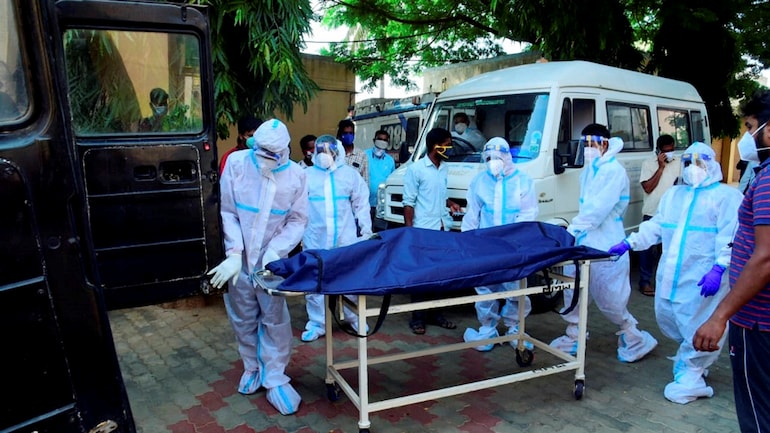New Delhi, June 15: A government panel studying COVID-19 vaccine side effects has confirmed the first death due to anaphylaxis following vaccination.
The causality assessment of 31 reported Serious Adverse Events Following Immunisation (AEFI) cases following COVID-19 vaccination was carried out by the panel.
According to a report by the National AEFI Committee, a 68-year-old man died due to anaphylaxis (severe allergic reaction) after being vaccinated on March 8, 2021.
"It is the first death linked to COVID-19 vaccination due to anaphylaxis. It re-emphasises the need to wait for 30 minutes at the inoculation centre after receiving the jab. Most of the anaphylactic reactions occur during this period and prompt treatment prevents deaths, Dr NK Arora, chairperson, National AEFI committee, told PTI.
The Committee examined five such cases that took place on February 5, eight cases on March 9 and 18 cases on March 31.
As per data in the first week of April, the reporting rate is 2.7 deaths per million vaccine doses administered and 4.8 hospitalisations per million vaccine doses administered, the report stated.
The panel said mere reporting of deaths and hospitalisations as serious adverse events does not automatically imply that the events were caused due to vaccines.
Only properly conducted investigations and causality assessments can help in understanding if any causal relationship exists between the event and the vaccine, the report said, adding for causality assessments, priority has been given to death cases.
Of the 31 causally assessed cases, 18 were classified as having inconsistent causal association to vaccination (coincidental - not linked to vaccination), 7 were classified as indeterminate, 3 cases were found to be vaccine product related, 1 was anxiety related reaction and two cases were found to be unclassifiable, the government panel report said.
Vaccine product related reactions are expected reactions that can be attributed to vaccination based on current scientific evidence, it said.
Examples of such reactions are allergic reactions and anaphylaxis, etc. Indeterminate reactions are reactions which have occurred soon after vaccination but there is no definitive evidence in current literature or clinical trial data that this event could have been caused due to the vaccine, the report said, adding further observations, analysis and studies are required.
In the two other cases of anaphylaxis, two persons were given vaccines on January 19 and 16 and both of them were hospitalised and have since recovered.
Unclassifiable events are events which have been investigated but there is not enough evidence for assigning a diagnosis due to missing crucial information. When this relevant information becomes available, the case may be reconsidered for causality assessment.
Coincidental events are events that are reported following immunisation but for which a clear cause other than vaccination is found on investigation.
The panel said benefits of vaccination are overwhelmingly greater than the small risk of harm and as a measure of utmost precaution, all emerging signals of harm are being constantly tracked and reviewed periodically.
Let the Truth be known. If you read VB and like VB, please be a VB Supporter and Help us deliver the Truth to one and all.
Hyderabad (PTI): Telangana Chief Minister A Revanth Reddy met Union Home Minister Amit Shah in Delhi on Wednesday night and urged him to increase the sanctioned strength of IPS officers to the state in view of its growing administrative and security needs.
The two leaders also discussed the recent surrender of several senior Maoist leaders before the Telangana Police and other issues.
"During the meeting, the two leaders discussed the issue of Maoist surrenders and their rehabilitation. The chief minister informed Shah that significant improvements in policing have taken place in Telangana over the past two years," an official release here said.
Highlighting that 591 Maoists have laid down their arms and joined the mainstream of society during this period, the chief minister said the state government was providing them compensation and rehabilitation assistance as per the rules.
He requested the Union home minister to extend financial support from the central government for development works in the backward regions of the state.
Reddy also urged Shah to increase the sanctioned strength of IPS officers to the state from 83 to 105 in line with the state's growing administrative and security needs, the statement said.
The first cadre review after the formation of Telangana was conducted in 2016, while the next review, due in 2021, was delayed and finally carried out in 2025. Even then, only seven additional IPS officers were allocated to the state, the chief minister informed Shah and requested that the third cadre review be conducted in 2026 as per the schedule.
Reddy explained that Telangana, like the rest of the country, is facing several modern challenges, including cybercrime, drug trafficking, white-collar crimes, and other emerging security threats.
He highlighted the reorganisation of the Hyderabad, Cyberabad, and Malkajgiri Police Commissionerates, the proposed formation of the Future City Commissionerate and the rapidly growing population in Hyderabad to underline the increasing administrative requirements of the state.





